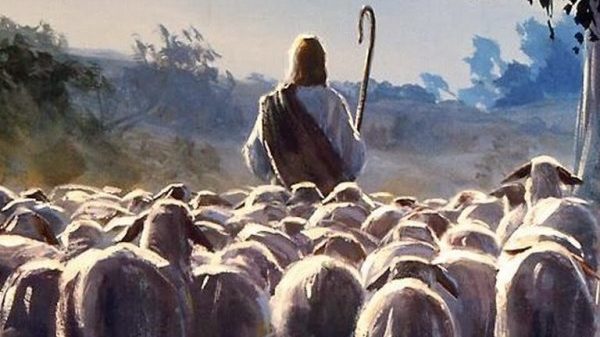Whose Voice are You Following?
4th Sunday of Easter (A)
click here for readings
Jesus and I have something in common. And no, I don’t just mean the awesome beard. We are both shepherds! My family and I raise Soay Sheep, which is a rare breed from the tiny St. Kilda islands off the northwest coast of Scotland. They are a primitive breed, and so very much like the sheep Jesus may have been familiar with two thousand years ago.
Part of their being a primitive breed means they have not been bred to be docile and trusting like most modern commercial sheep. In fact, our sheep are quite skittish. When we take visitors out, the sheep typically run to the far corner of the pasture and huddle together, glaring suspiciously in our direction. They don’t trust new people.
On the other hand, when I go out there by myself, the sheep run toward me, not away from me. They are comfortable coming near to me because they know me. I’m the one who makes sure they have food and water. I’m the one who cares for them. They trust me. And so they follow me.
Jesus says in this Sunday’s gospel, “he walks ahead of them, and the sheep follow him,because they recognize his voice.” The sight of a shepherd walking ahead of his sheep, with his flock obediently following behind, is common enough to those in agrarian cultures. But Jesus is using this image as a figure of speech. “I am the Good Shepherd,” he later says. “I know my sheep and mine know me” (Jn 10:14).
Jesus is the Good Shepherd. We are His flock. What does it mean to be a sheep in the flock of Christ? Undoubtedly it means many things, but let us focus now on the one thing Jesus mentions here. His sheep know Him. They recognize His voice.
What does it mean to recognize the voice of Jesus? One common frustration of Christians that I hear is I never hear God speaking to me. We long for some direction or some sign from God that we are on the right path, or to help us know what lies ahead. Do I go to grad school? Do I accept this job? Do I marry this person? Do I drop out of school? Should I be friends with this group? Lord, what do I do!? We ask these questions and when we don’t hear the Voice of God whispered in our ear, we may begin to doubt whether God is listening.
But God speaks to us all the time, in normal and ordinary ways. He does not hide from us. We must remember that He sent His Son into the world in order to be with us and make Himself known to us. So perhaps we just are not seeing all the plain, ordinary opportunities we have to hear the voice of our shepherd.
We hear God’s voice in the scriptures–not as a word that was spoken in the long ago past to long-dead people, but as a living word, spoken to us now. The Church teaches that “In the sacred books, the Father who is in heaven comes lovingly to meet His children, and talks with them” (Dei Verbum 21). As sheep who recognize the Shepherd’s voice, we should read the scriptures daily, especially those scriptures that the Church presents to us in the liturgy. We should hear it as God’s word spoken to us today.
We hear God’s voice in the Church. The Church is not called “the Body of Christ” for nothing. She is the continuation of the Incarnation in time. She is the fulfillment of Christ’s promise to be with us always. “As the Father has sent me, so I send you,” Jesus told the Apostles (Jn 20:21), and, “Whoever hears you, hears me” (Lk 10:16). We hear the voice of the Shepherd in the magisterial teachings of the Church. We should pay attention to them. We should be familiar with the Catechism and make an effort to integrate the Church’s teachings into our lives.
And yes, we do hear God’s voice when we pray. We may not hear it audibly, spoken in our ears as if God was sitting right next to us. Because God is closer than that. He’s not content to sit next to us, He wants to dwell within us. If we pray as one united to Christ, then we can hear the voice of Jesus in our very prayers. St. Augustine speaks of this: “He prays for us as our priest, prays in us as our Head, and is prayed to by us as our God. Therefore let us acknowledge our voice in Him and His in us” (qtd. in CCC 2616).
If we don’t hear the Shepherd’s voice in these ordinary ways, we should ask: are we really listening? Are we reading the scriptures prayerfully? Are we listening to what the Church teaches and taking it seriously? Are we praying on a daily basis?
There are other voices out there. There is no shortage of other voices shouting for our attention — and some of them can shout rather loudly. What other voices are we not just hearing, but listening to, allowing to influence our lives? What music do we listen to? What books do we read? What movies and tv shows do we watch? What friends do we surround ourselves with? Do we follow the teachings of politicians more than priests? Do we pace the authority of pop-stars over that of popes? Perhaps we don’t hear the Voice of the Shepherd because we are paying too much attention to these other voices.
Jesus says of His sheep, “they will not follow a stranger; they will run away from him, because they do not recognize the voice of strangers.” There is a reason why my sheep run to the far end of the pasture when someone they don’t know approaches. They don’t recognize that person. They know that’s not their shepherd. They don’t trust them. This instinct keeps them alive.
We should develop the same instinct to avoid those voices that compete with the Voice of the Good Shepherd. This doesn’t mean closing our ears and burying our heads in the ground. We should hear these voices of the world. We should be aware of them. But we shouldn’t recognize them. That is to say, we should not listen to them as if they were authoritative. Because — if we are truly members of Jesus’ flock — we know that we have but one Shepherd, and His voice is the One that we trust. His voice is the voice that leads us to verdant pastures and flowing streams. His voice is the only one that will lead us home.




